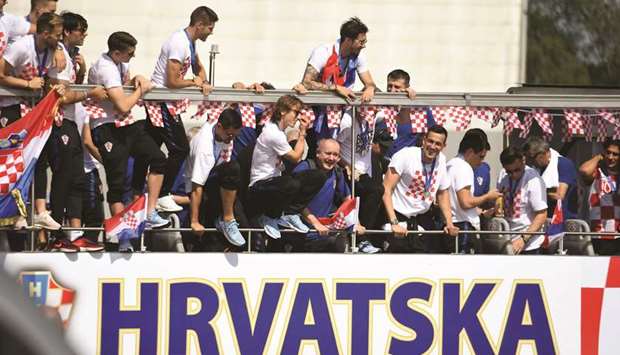The defeat was hard to accept, as was missing a chance that is not likely to come again in the lifetime of these players or fans. Everyone thought Croatia deserved more but the nation still celebrated, rather than mourned.
Crowds that flooded the streets of Zagreb and other cities to watch the final – among them, many foreign tourists and football fans who came just to be a part of it – stayed long into the night. The party, of course, was muted but it was still a party, not a wake.
“You made us proud,” Jutarnji list proclaimed on the front cover; “Thank you, heroes! You gave us everything,” said Sportske novosti. But it wasn’t just that – there was a genuine feeling of pride and gratitude among people.
For days Croatia existed in a parallel dimension facilitated by football, one where history lost significance because it was clearly being remade and everything, for once, seemed possible; no one was ready to give up that feeling and wake up to reality with its many constraints and low horizons.
If only for a while, football left most of Croatia happy and daydreaming, a feeling almost forgotten or never fully experienced by many. It did something that the nation’s political leaders have never managed to do and never will.
What they will try is to seize the opportunity to wrap themselves up in checkers and use the success for their populist agenda.
A plan to build a grand national stadium has already been pulled out of someone’s bottom drawer and put on top of the pile of promises. Croatian politicians are good at making those and the people are forgetful when it comes to fulfilling them.
This time, though, they might well go ahead and do it – because they have to do something and building one structure with taxpayers’ money is easy.
It is much harder to rebuild burnt bridges in domestic football and restore the people’s faith in something that has for years been dominated by criminal elements with close ties to powerful politicians.
It is much harder to build order from chaos, a lesson they could try to learn from the national team – but it’s the kind of lesson that gets you to a World Cup final, so not everyone is capable of following that masterclass.
When Croatia came third in the 1998 World Cup, it was still a new nation brimming with patriotic pride, forged in the bloody war for independence. The general outlook was optimistic, there was hope for the future and football played a significant part of it.
In retrospect, it is clear that the nation failed to learn anything from that. It failed as a society, now sharply divided along many ideological lines.
It failed as an economy, ending up as the least developed member of the European Union and with alarming emigration rates. Much has been said and written about the fact that Croatia is the second-least populous country – after Uruguay back in the day – to have reached a World Cup final, but the fact is that it has 300,000 fewer inhabitants than in 1998, according to official figures. At this rate, it could soon find itself at the bottom of that list.
But it failed in terms of football as well. Much more than a flashy five-star stadium where its leaders, football and otherwise, will come to flaunt their fandom and shake hands with their colleagues from other countries, it needs investment in infrastructure, education and grassroots.
It needs pitches and coaches across the country and a plan on how to harness its evidently extraordinary deep pool of talent. It needs to ensure that the Modrics and Lovrens of tomorrow can come through without first having to sell their soul to the likes of Zdravko Mamic.
It needs to create an atmosphere in which players, coaches, journalists or anyone else won’t be afraid they’ll jeopardise their status – or more – if they speak up about all the things that are wrong in the domestic game.
Every single player in this squad has a difficult background story to tell. They’ve been refugees of war, victims of agents and various other people trying to take advantage of them; some had been intentionally marginalised by their clubs or forced to leave before they were ready in order to save their careers.
Some have been compromised through their cooperation with villains and crooks and will have to bear consequences for that despite their success; some have been judged for not stepping up and breaking their silence, and rightly so.
But still they came out on top and made the World Cup final solely on their own merits. They succeeded despite, and not because of, everything that has been going on around them since the start of their careers.
On the global stage, where there are no shortcuts, they taught Croatia the value of hard work, dedication and togetherness. By coming second in the world, they gave themselves – and Croatia – a second chance, not just in football. They allowed the people to shoot for the moon once again; for that, we should all be grateful.

Croatian players parade through the streets of Zagreb on an open-top bus after their return from Moscow yesterday. (AFP)
